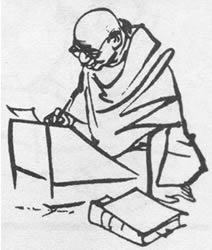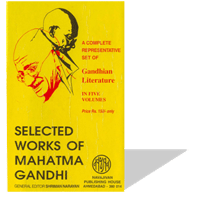
P.O. SEVAGRAM, DIST.WARDHA 442102, MS, INDIA. Phone: 91-7152-284753
FOUNDED BY MAHATMA GANDHI IN 1936
SECTION I : Selected Letters
[ from Selected Works of Mahatma Gandhi : Vol - 4 ]

SELECTED LETTERS
from
Selected Works of Mahatma Gandhi
Volume IV
Table of Contents
- Foreword
- Publisher's Note
SECTION I : LETTERS
- 1. To Dadabhai Naoroji
- 2. To G. K. Gokhale
- 3. To G. K. Gokhale
- 4. To Tolstoy
- 4A. From Count Leo Tolstoy
- 5. To Count Leo Tolstoy
- 6. To Leo Tolstoy
- 6A. From Count Leo Tolstoy
- 7. To Leo Tolstoy
- 7A. From Count Leo Tolstoy
- 8. To Maganlal Gandhi
- 9. To Maganlal Gandhi
- 10. To Narhar Shabhurao Bhave
- 11. To Mr Maffey, Private secretary To Viceroy
- 12. To W. B. Heycock
- 13. To Shankarlal on Ideas About Satyagraha
- 14. To Vinoba Bhave
- 15. To C F Andrews
- 16. To C F Andrews
- 17. To C F Andrews
- 18. To Kasturba Gandhi
- 19. To Kishorelal Mashruwala
- 20. To Sarojini Naidu
- 21. To Srinivas Sastri
- 22. To Srinivas Sastri
- 23. To Rabindranath Tagore
- 23A. From Rabindranath Tagore
- 24. To Rabindranath Tagore
- 25. From Rabindranath Tagore
- 25A. To Rabindranath Tagore
- 26. From Rabindranath Tagore
- 26A. To Rabindranath Tagore
- 27. To Rabindranath Tagore
- 28. To Rabindranath Tagore
- 29. To Rabindranath Tagore
- 30. To Rabindranath Tagore
- 31. To Rabindranath Tagore
- 32. From Rabindranath Tagore
- 32A. To Rabindranath Tagore
- 33. From G S Arundale
- 33A. To G S Arundale
- 34. To Every Englishman In India
- 35. To Viceroy
- 36. To Jawaharlal Nehru
- 37. To Jawaharlal Nehru
- 38. To Jawaharlal Nehru
- 39. To Jawaharlal Nehru
- 40. From Jawaharlal Nehru
- 41. To Jawaharlal Nehru
- 42. To Konda Venkatappayya
- 43. To T Prakasam
- 44. To Hakim Ajmal Khan
- 45. To Jamnalal Bajaj
- 46. To Mohomed Ali
- 47. To Motilal Nehru
- 48. To Motilal Nehru
- 49. To C Rajagopalachari
- 50. To C Rajagopalachari
- 51. To Kakasaheb Kalelkar
- 52. To A Friend
- 53. From Madeleine Slade or Miraben
- 53A. To Madeleine Slade
- 54. To Romain Rolland
- 55. To Romain Rolland
- 56. To Shri Shankaran
- 57. To Hermann Kallenbach
- 58. To Gulzarilal Nanda
- 59. To Dr Kailas Nath Kaju
- 60. To Dhan Gopal Mukherjee
- 61. To Henry S Salt
- 62. To The Viceroy
- 63. To Lord Irwin
- 64. To Reginald Reynolds
- 65. To Richard B Gregg
- 66. To Sir Samuel Hoare
- 67. To Ramsay MacDonald
- 68. To Pandit Malaviyaji
- 69. To The Secretary To The Government of Bombay, (Home Dept.), Poona
- 70. To Sir Tej Bahadur Sapru
- 71. To Carl Heath
- 72. To Carl Heath
- 73. To Carl Heath
- 74. To M A Jinnah
- 75. To M A Jinnah
- 76. To M A Jinnah
- 76A. From M A Jinnah
- 77. To M A Jinnah
- 78. From Subhash Chandra Bose
- 78A. To Subhash Chandra Bose
- 79. To Herr Hitler
- 80. To Every Briton
- 81. To Every Briton
- 82. To Generalissimo Chiang Kai-Shek
- 83. To Every Japanese
- 84. To American Friends
- 85. To Lord Linlithgow
- 86. To Lord Linlithgow
- 86A. From Lord Linlithgow
- 87. To Lord Linlithgow
- 87A. From Lord Linlithgow
- 88. To Lord Linlithgow
- 88A. From Lord Linlithgow
- 89. To Lord Linlithgow
- 90. To Agatha Harrison
- 91. To Winston Churchill
- 92. To Shriman Narayan
- 93. To Lord Pethick Lawrence
- 94. To Sardar Vallabhbhai Patel
- 95. To The Viceroy
- 96. To The Viceroy
- 96A. From Lord Mountbatten
- 97. To Abdul Ghaffar Khan
- 97A. From Abdul Ghaffar Khan
- 98. To A Friend
- 99. To Madame Edmond Privat
- 100. To The People of Gujarat
- Appendix I: Who Should Be Provincial Governors?
- Appendix II: A Psychological Explanation
- Appendix III: The Gandhian Constitutions for Free India
SECTION II : EXTRACTS FROM LETTERS
- Faith in God
- Religions and Scriptures
- Value of Prayer
- Truth and Non-violence
- The Science of Satyagraha
- Fasting in Satyagraha
- Unto This Last
- Khadi and Village Industry
- East and West
- Hindu-Muslim Unity
- Upliftment of Women
- The Good of All
- India's Freedom
- Education
- Caste System and Untouchability
- Brahmacharya
- Fearlessness
- Health and Hygene
- Self-restraint
- Self-development
- Selfless Service
- Voluntary Poverty
About This Volumes

Selected Works of Mahatma Gandhi comprises of Five volumes.
- Vol-I: Autobiography
- Vol-II: Satyagraha in South Africa
- Vol-III: Basic Works
- Ethical Religion
- Unto This Last
- Hind Swaraj or Indian Home Rule
- From Yeravada Mandir
- Discourses on the Gita
- Constructive Programme
- Key to Health
- Vol-IV: Selected Letters
- Vol-V: Voice of Truth
This book, Selected Letters, is volume-4.
Written by : M. K. Gandhi
General Editor : Shriman Narayan
Volume
Selected Works of Mahatma Gandhi : A set of five books
ISBN: 81-7229-278-3 (set)
Printed and Published by :
Jitendra T. Desai
Navajivan Mudranalaya,
Ahemadabad-380014
India
© Navajivan Trust, 1968
Download
Gandhi Letter 19 : To Kishorelal Mashruwala1
Nadiad,
July 29, 1918
DEAR KISHORELAL,
This letter is meant for you and Shri Narahari. To the extent that
Shri Narayanarao's charge that distinctions are made between Maharashtrians
and Gujaratis is justified, it is our duty to try to remove the causes.
Here is a field for the exercise of non-violence. The first step to
take is for you all to come together and examine how much of truth
there is in the charge. The Gujarati ladies should try to mix freely
with the Maharashtrian ladies. The most important thing is to see
that the children make no such distinction. It is not necessary to
give exaggerated importance to what I have said; just reflect over
it for a moment and do all that may need to be done.
As for prayers, I place this before you for consideration. We should
not take the plea of inability so far that, in the end, we find ourselves
incapable of doing anything at all. We should do the teaching as well
as we can and overcome our shortcomings by gradual effort. Do you
think I would use the plea of inability if I was myself required to
teach Sanskrit? I know that my Sanskrit is no Sanskrit. But I would
certainly teach it if no other person was available and I would get
over my deficiency day by day. It was in this way that Parnell topped
them all in his knowledge of the rules of business in the House of
Commons. You always think of your weakness and are afraid of doing
anything. Would you not be happier if, using all your strength, you
disposed of every task that fell to you?
In what manner should the children learn to use their strength? It
is a difficult thing to teach them to defend themselves and yet not
be overbearing. Till now, we used to teach them not to fight back
if anyone beat them. Can we go on doing so now? What will be the effect
of such teaching on a child? Will he, in his youth, be a forgiving
or a timid man? My powers of thinking fail me. Use yours. This new
aspect of non-violence which has revealed itself to me has enmeshed
me in no end of problems. I have not found one master-key for all
the riddles, but it must be found. Shall we teach our boys to return
two blows for one, or tolerate a blow from anyone weaker than themselves
but to fight back, should a stronger one attack them, and take the
beating that might follow ? What should one do if assaulted by a Government
official? Should the boy submit to the beating at the moment and then
come to us for advice, or should he do what might seem best in the
circum¬stances and take the consequences? These are the problems
which face us if we give up the royal road of turning the other cheek.
Is the first course the right one because easier to take? Or is it
that we shall come upon the right path only by treading through a
dangerous one? The foot-tracks which go up the Himalayas lead in all
directions, sometimes even away from the destination and yet an experienced
guide will take us in the end to the summit. One cannot climb the
Himalayas in a straight line. Can it be that, in like fashion, the
path of non-violence, too, is difficult? May God protect us, may He
indeed.
Vandematram from
MOHANDAS
Collected Works of Mahatma Gandhi, Vol. XIV PP- 515-16
- Kishorelal G. Mashruwala (1890-1952)—Most authorita¬tive interpreter of Gandhian thought; Gandhiji's life-long associate: Editor Harijan (48-52); Author of Gandhi and Marx, Practical Non-violence, etc